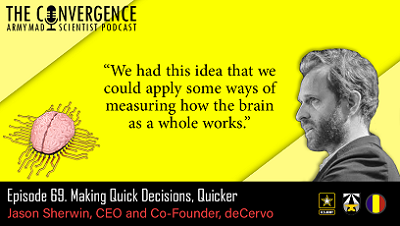[Editor’s Note: Army Mad Scientist is pleased to present our latest episode of The Convergence podcast, featuring our interview with proclaimed Mad Scientist Jason Sherwin, CEO and Co-Founder of deCervo, discussing the science of quick decision making, how deCervo blends gaming with science to help individuals make the best decisions in high stakes and complex environments, how these technologies have enhanced professional athletes’ performance, and these technologies’ potential for enhancing Soldiers’ performance — Enjoy!]
[If the podcast dashboard is not rendering correctly for you, please click here to listen to the podcast.]
 Jason Sherwin, Ph.D., is a founder and currently serves as CEO of deCervo, a neuroscience tech company he founded with his research partner, Jordan Muraskin, Ph.D. Since starting in 2014, deCervo has provided cognitive training programs using neuroimaging and customized phone apps to over 15 Major League Baseball organizations, over 60,000 baseball and softball players worldwide, the umpires of the Major Leagues, and the officials of the National Hockey League. deCervo has been an Army research grant recipient since 2017 and Sherwin himself has done contract research for the U.S. Army Combat Capabilities Development Command Army Research Laboratory going back to 2011. Continuing to apply its novel approach to decision training, deCervo is currently launching apps in law enforcement and tennis training to complement its suite of five other apps for decision training.
Jason Sherwin, Ph.D., is a founder and currently serves as CEO of deCervo, a neuroscience tech company he founded with his research partner, Jordan Muraskin, Ph.D. Since starting in 2014, deCervo has provided cognitive training programs using neuroimaging and customized phone apps to over 15 Major League Baseball organizations, over 60,000 baseball and softball players worldwide, the umpires of the Major Leagues, and the officials of the National Hockey League. deCervo has been an Army research grant recipient since 2017 and Sherwin himself has done contract research for the U.S. Army Combat Capabilities Development Command Army Research Laboratory going back to 2011. Continuing to apply its novel approach to decision training, deCervo is currently launching apps in law enforcement and tennis training to complement its suite of five other apps for decision training.
In today’s podcast, we talk with Jason about the science of quick decision making, how deCervo blends gaming with science to help individuals make the best decisions in high stakes and complex environments, how these technologies have enhanced professional athletes’ performance, and these technologies’ potential for enhancing Soldiers’ performance. The following bullet points highlight key insights from our interview:
-
-
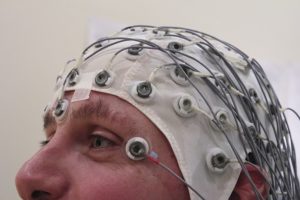 Analyzing quick decision-making is done by providing simple stimuli to people, imaging their response and its speed, and identifying how their brain reacts to different inputs. This can be accomplished by having a subject listen to a song with an unexpected, abrupt key change; not only do brains show a reaction to that unexpected change, but trained musicians’ brains produce a stronger response, as captured via electroencephalogram (EEG), than a non-musician’s brain.
Analyzing quick decision-making is done by providing simple stimuli to people, imaging their response and its speed, and identifying how their brain reacts to different inputs. This can be accomplished by having a subject listen to a song with an unexpected, abrupt key change; not only do brains show a reaction to that unexpected change, but trained musicians’ brains produce a stronger response, as captured via electroencephalogram (EEG), than a non-musician’s brain.
-
-
-
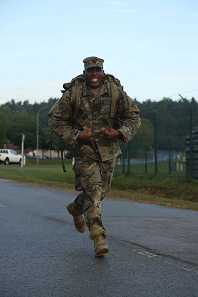 deCervo’s apps for baseball players use accuracy measurements to estimate how well the user discriminates between different kinds of pitches. This approach is an evolution from using EEGs, and shows that non-invasive methods can be just as effective in measuring responses. Improving athletic prowess on the playing field has direct implications for improving warfighting prowess on the modern battlefield.
deCervo’s apps for baseball players use accuracy measurements to estimate how well the user discriminates between different kinds of pitches. This approach is an evolution from using EEGs, and shows that non-invasive methods can be just as effective in measuring responses. Improving athletic prowess on the playing field has direct implications for improving warfighting prowess on the modern battlefield.
-
-
-
- Emotion impacts all decision making, but deliberate decisions are more susceptible to influence from emotion and often require simulations generated by video or AI to produce environments that
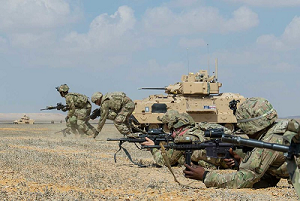 are closer to real life. For Soldiers, decisions often need to be deliberate while dealing with fear and strong emotion in dynamic, austere, and potentially lethal environments; training for this kind of decision making requires teaching people how to respond quickly and correctly, despite emotional impacts or inhibition.
are closer to real life. For Soldiers, decisions often need to be deliberate while dealing with fear and strong emotion in dynamic, austere, and potentially lethal environments; training for this kind of decision making requires teaching people how to respond quickly and correctly, despite emotional impacts or inhibition.
- Emotion impacts all decision making, but deliberate decisions are more susceptible to influence from emotion and often require simulations generated by video or AI to produce environments that
-
-
-
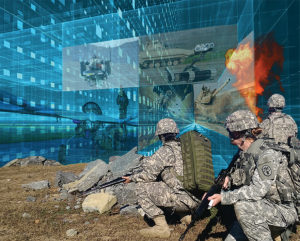 Military decision making can involve simple decisions like target detection, but more often requires the ability to make complex, deliberate decisions. Using effective human teaming and social sensing can help train for visual search type decisions where Soldiers analyze their own placement and their teammates’ placements and effectively respond as a team.
Military decision making can involve simple decisions like target detection, but more often requires the ability to make complex, deliberate decisions. Using effective human teaming and social sensing can help train for visual search type decisions where Soldiers analyze their own placement and their teammates’ placements and effectively respond as a team.
-
-
-
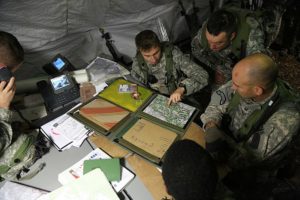 Using a deCervo app is like getting the Cliff’s Notes on how to do your job better. It’s not just about training for better decision making, but also informing users about what making those decisions quickly feels like, what it means to identify the correct response, and what to do next so users trust what the system is training them to do.
Using a deCervo app is like getting the Cliff’s Notes on how to do your job better. It’s not just about training for better decision making, but also informing users about what making those decisions quickly feels like, what it means to identify the correct response, and what to do next so users trust what the system is training them to do.
-
-
-
 Real-time decision making for military applications could even be supplemented by technology that assists and optimizes the situation for choosing correct responses, and quick decision-making training with such tools can build Soldiers’ trust in the ways these systems assist them.
Real-time decision making for military applications could even be supplemented by technology that assists and optimizes the situation for choosing correct responses, and quick decision-making training with such tools can build Soldiers’ trust in the ways these systems assist them.
-
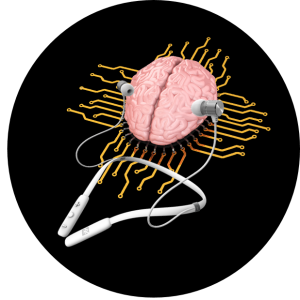
Stay tuned to the Mad Scientist Laboratory for our next episode of The Convergence, recorded on location at I/ITSEC, the world’s largest modeling and simulation conference in Orlando, FL. We’ll be talking with proclaimed Mad Scientist Jenny McArdle from Improbable, Cmdr. Paul Grøstad from NATO ACT, and Whitney McNamara from Beacon Global Strategies about emerging technologies and competition and conflict.
If you enjoyed this post and podcast, check out the following related content:
It’s All In Your Head: How The Brain Makes Better Soldiers and podcast, with Zach Schonbrun
The Future of Learning: Personalized, Continuous, and Accelerated
The Guy Behind the Guy: AI as the Indispensable Marshal, by Brady Moore and Chris Sauceda
AI Enhancing EI in War, by then MAJ Vincent Dueñas
An Appropriate Level of Trust…
Proclaimed Mad Scientist Juliane Gallina‘s Arsenal of the Mind presentation at the Mad Scientist Robotics, AI, & Autonomy Visioning Multi Domain Battle in 2030-2050 Conference at Georgia Tech Research Institute, Atlanta, Georgia, on 7-8 March 2017
Proclaimed Mad Scientist Dr. Tristan McClure-Begley‘s presentation and video on Targeted Neuroplasticity Training. from the Mad Scientist Learning in 2050 Conference, at Georgetown University in Washington, DC, on 8-9 August 2018
Proclaimed Mad Scientist Dr. James Giordano‘s presentation and video on Neurotechnology in National Security and Defense, from the Mad Scientist Visioning Multi Domain Battle in 2030-2050 Conference, at Georgetown University in Washington, DC, on 25 & 26 July 2017; and his Neuroscience and the Weapons of War podcast, hosted by our colleagues at Modern War Institute (MWI), 2 August 2017
Top Ten Bio Convergence Trends Impacting the Future Operational Environment, Bio Convergence and Soldier 2050 Conference Final Report, and the comprehensive Final Report from the Mad Scientist Bio Convergence and Soldier 2050 Conference with SRI International at their Menlo Park campus in California on 8–9 March 2018
A New American Way of Training and associated podcast, with Jennifer McArdle
The Metaverse: Blurring Reality and Digital Lives and associated podcast, with Cathy Hackl
Fight Club Prepares Lt Col Maddie Novák for Cross-Dimension Manoeuvre, by then LTC Arnel David, U.S. Army, and Major Aaron Moore, British Army, along with their interview in The Convergence: UK Fight Club – Gaming the Future Army and associated podcast
The Last Frontier, by PFC Peter Brenner
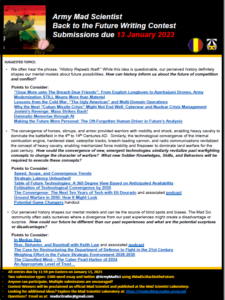 Back to the Future Writing Contest: Crowdsourcing is an effective tool for harvesting ideas, thoughts, and concepts from a wide variety of interested individuals, helping to diversify thought and challenge conventional assumptions. Army Mad Scientist seeks to crowdsource the intellect of the Nation (i.e., you — our community of action!) with our Back to the Future Writing Contest. Entries should address one of the suggested topics listed here. Entries will be accepted in two formats:
Back to the Future Writing Contest: Crowdsourcing is an effective tool for harvesting ideas, thoughts, and concepts from a wide variety of interested individuals, helping to diversify thought and challenge conventional assumptions. Army Mad Scientist seeks to crowdsource the intellect of the Nation (i.e., you — our community of action!) with our Back to the Future Writing Contest. Entries should address one of the suggested topics listed here. Entries will be accepted in two formats:
-
-
- A written essay (no more than 1500 words, please!)
-
-
-
- A tweet @ArmyMadSci using #MadSciBacktotheFuture
-
We will pick a winner from each of these two formats! Contest Winners will be proclaimed official Mad Scientists and be featured here in the Mad Scientist Laboratory. Semi-finalists of merit will also be published!
This contest is open to any and every one — multiple submissions are encouraged!
DEADLINE: All entries are due NLT 11:59 pm Eastern on January 13, 2023!
Looking for additional ideas? Explore the Mad Scientist Laboratory at: https://madsciblog.tradoc.army.mil
Questions? Send us an eMail at: madscitradoc@gmail.com
Disclaimer: The views expressed in this blog post and podcast do not necessarily reflect those of the U.S. Department of Defense, Department of the Army, Army Futures Command (AFC), or Training and Doctrine Command (TRADOC).

